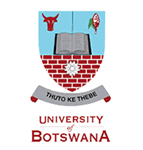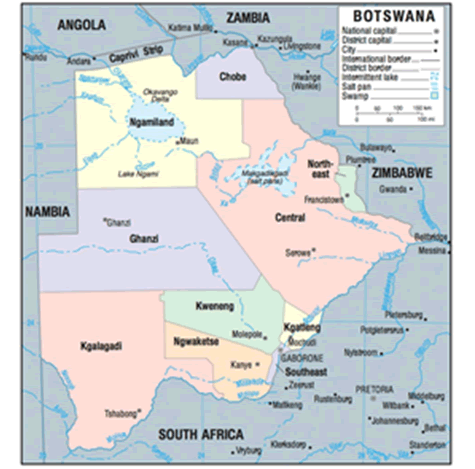 KEY PERSONNEL: Dr. Keneilwe Motlhatlhedi (PI and Training Coordinator), Nthabiseng Phaladze (Co-PI), Dr. Mosepele Mosepele (Additional key personnel), Malebogo Masono (Finance administrator), Ari Ho-Foster (Finance administrator), Dr. Mmoloki Molwantwa (eLearning Coordinator)
KEY PERSONNEL: Dr. Keneilwe Motlhatlhedi (PI and Training Coordinator), Nthabiseng Phaladze (Co-PI), Dr. Mosepele Mosepele (Additional key personnel), Malebogo Masono (Finance administrator), Ari Ho-Foster (Finance administrator), Dr. Mmoloki Molwantwa (eLearning Coordinator)
PROJECT TITLE: STRIPE HIV – University of Botswana (SHUB)
PROJECT YEAR 1 RECAP:
In the first year of STRIPE HIV, the SHUB team trained 31 facilitators to lead 9 workshops and 307 learners to deliver high quality, team-based HIV care. Of the 307 learners, 189 were pre-service learners and 118 were postgraduate learners. During this training, they promoted interprofessional education across university health care departments and faculties. In addition, they developed a mobile application to increase access to STRIPE HIV training, especially in the context of COVID-19.
PROJECT YEAR 2 SUMMARY:
A total of 155 learners were trained by eight facilitators over the course of two training cycles. In both cycles, learners were taught the four core modules plus four additional modules (5, 8, 9, and 19).
The first cycle was focused on post-graduate learners and included two cohorts, with the first accessing STRIPE material through the STRIPE UB-specific online course which adapted STRIPE content to the Botswana-specific context. The second cohort accessed STRIPE material through the STRIPE Virtual Workshop course. The cadence of progressing through the STRIPE curricula differed depending on which course learners took; the STRIPE UB-specific online course took five weeks, with learners completing two modules and two zoom sessions per week, including an orientation and two zoom catch-up sessions as needed. The STRIPE Virtual Workshop course covered all eight modules over the course of three weekends, covering two to three modules per week.
The second cycle was focus on final year health professions students, who all used the STRIPE UB-specific online course. The STRIPE UB-specific online course was chosen over the STRIPE Virtual Workshop course as it allowed for greater flexibility in scheduling.
The SHUB team continued working on a mobile application initially developed in year one. Based on user feedback, four additional modules were added and groups formed with a discussion board for questions and comments. This allowed for more interactive capability on the app. In addition, user feedback identified two modules which were difficult to cover in the mobile application format, and the format of the pre- and post-quiz questions were adjusted to account for this.
A link to the mobile application, currently available for android devices, is below: https://play.google.com/store/apps/details?id=bw.ub.cs.ub_stripehiv_mobile
MAIN ACCOMPLISHMENTS
- Using online training technologies, learners were successfully recruited from diverse areas of Botswana, including more rural areas. In-person training would have restricted participants due to work, transportation, and accommodation needs.
- More learners were trained than anticipated, 155 vs. 80. In addition, more pre-service learners registered than anticipated, 99 vs. 64.
- The STRIPE UB-specific online course was adapted to the Botswana-specific context.
CHALLENGES AND SOLUTIONS
- Due to scheduling conflicts, not all facilitators were able to attend all the AFREhealth training webinars. To support them, the SHUB team conducted weekly meetings to share information from these webinars, as well as review the LMS and the virtual course.
- Few doctors and nurses were enrolled in the trainings, with many given additional COVID-19 related responsibilities and a heavy workload during this time. This resulted in a higher proportion of post-graduate learners in the “other” professional category. This turned into a teaching opportunity for learners to better understand the roles and responsibilities of those in the “other” category, such as health care assistants or HIV counselors, to provide HIV care.
- To support learners to keep pace with the course, learner performance was tracked with a standardized form. This was then reported out to the other team members at weekly meetings and strategies for improvement were discussed.
PARTICIPATING CINICAL SITES
Below is the list and a map of the PEPFAR-supported clinical sites that contributed post-graduate learners:
- Ngamiland (Maun), Tutume (Gweta, Sowa), Northeast (Masunga), Bobirwa (Bobonong), Selebi Phikwe, Palapye, Serowe, Mahalapye, Lobatse, Gaborone, Southern (Kanye, Thamaga) and Kasane

IMPLEMENTATION
- Training cohorts: 3
- Facilitators Trained: 8
|
Profession |
Years of Experience |
Gender |
Teaching Experience |
||||
|
Medical |
4 |
0-5 years |
0 |
Male |
4 |
HIV educator |
3 |
|
Nursing/Midwifery |
3 |
6-10 years |
1 |
Female |
4 |
Non-HIV educator |
5 |
|
Pharmacy |
0 |
> 11 years |
7 |
Additional |
0 |
||
|
Laboratory |
1 |
|
|
||||
|
Other |
0 |
|
|
||||
- Registered Learners trained: 155
|
Medical |
Nursing/Midwifery |
Pharmacy |
Laboratory |
Other |
Total |
|
|
Preservice |
16 |
45 |
19 |
19 |
0 |
99 |
|
Postgraduate < 12 months |
2 |
1 |
0 |
0 |
4 |
7 |
|
Postgraduate > 12 months |
14 |
10 |
4 |
0 |
21 |
49 |
|
Total |
32 |
56 |
23 |
19 |
25 |
155 |
|
Gender |
|
|
Male |
93 |
|
Female |
41 |
|
Additional |
1 |
|
Unknown |
20 |
|
TOTAL |
155 |
INNOVATING HIV TRAINING DURING COVID-19:
There were three main challenges related to COVID-19: 1) change in type of learners recruited, 2) training was dependent on local internet bandwidth, 3) change in training dates. The training level and health professions of learners was different than expected. More pharmacy, laboratory, and other health professions attended the training and more pre-service, rather than post-graduate, learners were enrolled, as the latter were more likely to be pulled into COVID-19 related activities.
The second major challenge was that training was dependent on internet bandwidth and connectivity. To combat poor connectivity, video was often turned off during the Zoom meeting and learners were encouraged to use the Zoom chat feature to participate in conversations. In addition, learners were provided with some pre-paid data to attend the training. WhatsApp groups were also formed, to encourage more efficient communication between learners and training staff.
Lastly, training dates were pushed as schools were closed due to high COVID-19 caseloads in those areas. The training team was flexible and moved training dates to align with when learners were available.
BROADER IMPACT:
Pre-service learners, as well as post-graduate learners recruited from PEPFAR-supported sites, received practical case-based HIV training, with special attention paid to creating an interprofessional team and identifying ways to improve quality. Ideally, this will translate to their work and enhance the quality of care provided to patients. Informal talks have begun between the PIs and the department heads at the Health Sciences Training unit in promoting STRIPE programming.
Work is underway on a qualitative paper summarizing interviews with learners, with a focus on use of the online platform for learning during the COVID-19 pandemic. In addition to pre- and post-quizzes, learners were asked to respond to the Interprofessional Collaborative Competency Attainment Survey (ICCAS) before and after training. The information from the interviews will be merged with the learner responses to the ICCAS to provide a deeper understanding of the impact of the training. In addition, a quantitative paper will also be produced for publication in a peer-reviewed journal.
IMPACT VIGNETTES
“Online training has helped us reach more health professionals across the country. For example, with the previous face-to-face training we could only go to one district at a time, however during our last training we had participants from as far as Kasane (the most northern district in Botswana) to Lobatse which is south of the capital. Additionally, online learning allows for flexible hours which in our opinion minimized disruption of day-to-day work schedules.” – Training Team
“Most of the learners for who participated in the virtual training were happy with the training. Some of the quotes from the learners are below:
‘even though the hours were long the meeting is ()’
‘thank you very much loved it! Even though at around 12:30 we had a power cut which affected my connectivity! But I’d like to extend my gratitude’”
– Training Team
“The students seemed to enjoy the learning. Although there were technical/network issues many said they had learnt a lot and were able to complete the training. They said they appreciated the inter-professional goals of the training.” – Training Team
“The transition from the face-to-face training to online training has been interesting. It was much needed and many of the facilitators felt that it helped them get used to the idea of learning and teaching online. The experience with Zoom and how to use it as a facilitator is appreciated. Although the training allowed flexibility it increased workload as working/learning outside of traditional working hours is not se







